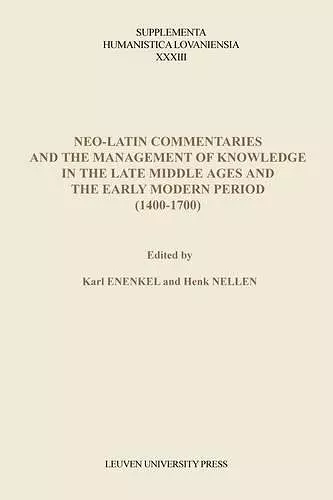Neo-Latin Commentaries and the Management of Knowledge in the Late Middle Ages and the Early Modern Period (1400–1700)
Karl Enenkel editor Henk Nellen editor
Format:Paperback
Publisher:Leuven University Press
Published:15th Jul '13
Currently unavailable, our supplier has not provided us a restock date

Profound study of one of the most important genres within Humanist scholarship
Between 1400 and 1700 the political, religious, intellectual, and even geographic landscape was profoundly changed by the Reformation, Humanism, the rise of empirical science, the invention of printing technology, and the discovery of the New World. The late medieval and early modern intellectuals felt an urgent need to respond to the changes they were involved in, and to come to a revision and re-authorisation of knowledge. They embarked on a scholarly programme of a quality and extent hitherto unknown in the Western world: the whole body of the literature of antiquity, including the Bible, was to be re-edited critically and furnished with commentaries. The Neo-Latin commentary became the most important genre of humanist scholarship. This book sheds light on the various ways in which classical authors and the Bible were commented on, the types of commentary, the commenting strategies that were used to approach different readerships, the various kinds of knowledge that were collected, created, and transmitted, and the usages and reading practices applied to commentaries.
Contributors
K. Enenkel (Westfälische Wilhelms-Universität, Münster), S. de Beer (Leiden University Centre for the Arts in Society), C. Kallendorf (Texas A&M University), C. Pieper (Leiden University Centre for the Arts in Society), M. Pade (Aarhus University), V. Berlincourt (Université de Genève), J. Bloemendal (Huygens Institute for the History of the Netherlands), V. Wels (Berlin), W. J. Zwalve (Institute for the Interdisciplinary Study of the Law, Leiden University), B. H. Stolte (University of Groningen), B. Roling (Institut für Griechische und Lateinische Philologie, Freie Universität Berlin), H. Nellen (Huygens Institute for the History of the Netherlands), J. Touber (Utrecht University)
This collection amounts to a taxonomy of commentaries and may actually prove more useful than a theory would have been.
David Scott Wilson-Okamura, THE NEO-LATIN NEWS Vol. 63, Nos. 1&2
Collectively, the essays show the commentary genre moving variously, in some cases reaching a saturation point of encyclopedic detail, in others, achieving a reverse commentary in undoing the work of past exegetes. The essays also show, on the one hand, commentaries virtually standing free (''scholars often avoided studying the source text in favor of the commentary'' [27]), on the other hand, as subservient to their source texts. Indeed, the great weight of an authoritative text thwarting the commentator's desire to emend is described in the articles on law by Willem Zwalve and Bernard Stolte. As the editors intended, here is a starting point for detailed study of an understudied genre. This substantive, if not comprehensive, collection is carefully edited and fully annotated, with an index nominum, and contains only a few printing errors (e.g., ''posses'' [253]; ''Bibla'' [452]).
DANIEL J. NODES, Baylor University, Renaissance Quarterly 67.4 (Winter 2014).
ISBN: 9789058679369
Dimensions: unknown
Weight: 907g
528 pages